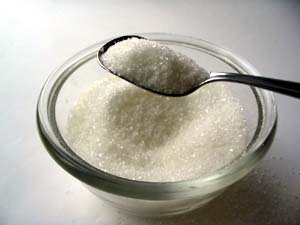
Sweeteners
The Food Drug Administration (FDA) regulates the use of sweeteners and it has established an acceptable daily intake for each artificial sweetener
| Product | Positive | Negative |
|---|---|---|
| Saccharin | Zero calorie, no increase in blood sugar | Possibility of bladder cancer (still debatable), possibility of allergic reactions. Not safe for infants or pregnant women, causes irritability, muscle dysfunction. |
| Aspartame (Non-Saccharide Sweetener) |
Provide less calories than sugar | Watch out for symptoms like headache, abdomen pain, spasms, anxiety and depression. The debate continue for the evidence for tumors and cancer. |
| Suralose | Less calories, non-carcinogenic | Too much chemical formulation, presence of chlorine makes it little risky. Interferes with the absorption of prescribed medications. |
| Acesulfame | Contains carcinogen-methylene chloride | Long term exposure leads to headaches, nausea, kidney, visual disturbances. |
The American Dietetics Association (ADA) and American Heart Association (AHA) have given a cautious nod to the use of these sweeteners in place of sugar to combat obesity, metabolic syndrome and diabetes. Use of artificial sweeteners can make you shun healthy and nutritious food while consuming more artificially flavoured food.
There are natural sugar substitutes which are promoted as healthier options and often undergo processing and refining making their vitamin and mineral content lower. Natural options recognised as safe by FDI include:
- Date sugar
- Honey
- Maple sugar
- Molasses
- Agave nectar